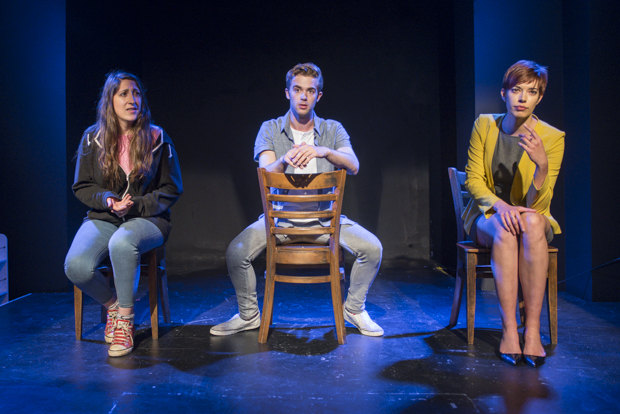
 (5 / 5)
(5 / 5)
The Other Room Theatre, founded in 2014, is not only Cardiff’s first pub-theatre, but it is a platform for all theatre creatives in Cardiff to produce, showcase, and be showcased as exciting, emerging artists, in their own right. Also, did I mention that they are Fringe Theatre of the Year? This year’s cohort (the second to tread the, alcoholically doused, boards of Porter’s bar) certainly held a prestige in being there. The festival itself only reflects what The Other Room already embodies in its very existence: collaboration, support and exploration; a platform, a place where you land your first job. As participants of, not only, an intense work-shopping programme but a profit share job, the young artists finished the week with enough of the box office profits to forget the majority of the days before by paying their round at the bar. Young director, Bruno Chavez, (previously involved in the 2015 festival as a writer) beautifully articulated, when expressing his own experiences with TOR, that ‘The festival is a purified version of what theatre is.’ Bruno, as well as young writer Susan Monkton (previously an acting participant), are proof of TOR’s undeniable devotion to their community. And, after director Kate Wasserberg’s declared, on the very first day, ‘You’re our guys now’ the sentiment became only more solidified.
In order to respond to the festival with the respect and admiration that I hold for it, and everyone involved, demanded from me was a personal investment – a vulnerability and an immersion. I began writing a play about garden gnomes, I played a ‘dramatised’ game of ‘Never have I ever’, and began to develop a directorial eye for pioneering, new theatre. But, I never f***ed the chair… So, yes, I now hold very little objectivity, but the The Other Room’s dedicated ethos in its love for artists is infectious.
It seems only apt that TOR team would open the festival, Monday morning, with an introduction to starting a company from scratch. Something emphasised by every industry professional from Tamara Harvey (Artistic Director of Theatr Clwyd) to Gemma McAvoy (Agent from Emptage and Hallett) was the roots accessible to an emerging artist, and a desire to empower the individuals. Unfortunately, if I were to delve as far as I would like, into all the insightful workshops we have experienced this week, this would end up resembling a governmental report, so that’s not happening. However, highlighted by Tamara and Kate was a need for equality within our industry (not only as female directors but as parents, regardless of gender); it is something that I’d like to reiterate. Following http://www.pipacampaign.com/, provides support to the Parents in Performing Arts campaign, allowing equal opportunities and access for parents and carers working in the performing arts. Now, for any aspiring theatre makers, to gain just some of the knowledge and empowerment that the chosen 40 artists involved in the festival have acquired, the following websites are not to be overlooked: https://www.equity.org.uk/home/ and http://www.arts.wales/. Of course, you could just sign up for next year’s festival. Stay posted via http://www.otherroomtheatre.com/en/.
Acting, writing, stage management and directing are professions massively stigmatised, and consequently individuals succumb to a generalised stereotype. The stereotype is wholly valid… Stereotypically, they are rule-breaker. Artists – they deify revolution, eccentricity and creation! Required for such demanding crafts are: specifically unique individuals, indispensable in their, collaborative, quest for creation. So, these people, that is what this article and this festival is all about.
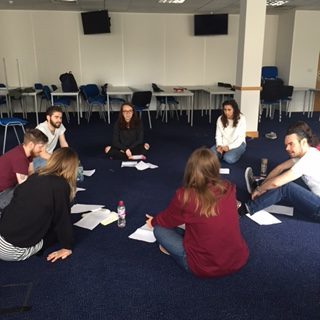
Most of the week culminates to the formation of the artistic companies and their performances of new, ten minute, plays written by acclaimed playwrights; Joel Horwood, Morgan Lloyd Malcolm, Lisa Jen, Alun Saunders and Sam Burns. Shadowing these companies has not only been insightful, but a lot of fun! At this point I would like to throw a shout out to Porthcawl Comp who let me chill in a bar all week, in the name of work experience – you the real MVP. So, without any further ado, here’s what the companies did, and how that became to be.
Mirror Loop – Morgan Lloyd Malcolm
A primal uproar against society’s shredding and crippling expectations. As women continue to precipitate actions of self-deprecation and disbelief in ability we subject the next generation to the cycle. The unity of women in a palindrome of a script. Of course, we could also see the piece as a comparison between the mid-life crisis and the intoxicated, purposeless 20 something.
What really struck me about this company, led by Seren Vickers, was the call for an open dialogue and conversation. As a response to this, actors, Andrea Edwards and Alexandra Lewis clearly embedded their souls, in a devotion to the truth within this piece of feminist prose. The scattering of a character’s direction, thoughts and inanimate props seamlessly fuel an uprising for something more.
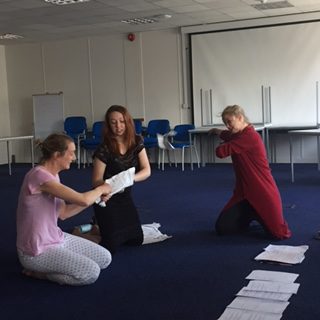
Look Up – Nicola Reynolds
Thought provokingly normal. All of us have had conversations which hold a clear resemblance to that of these characters’. We all have experienced, or can acknowledge, a friendship with unexplainable depth; how much do we, and can we, actually understand? And, should we be questioning the societal demands to talk ‘Game of Thrones’ around confessional suicidal thoughts. Susie Gale and Lauren Page, in the space of days, were able to develop an unwavering bond that bred a very real and tangible world within The Other Room.
The bleakness of an exposed hate, post-EU Referendum, the indifference to prior civil awakenings, and the objectification of a society’s primped and preened as sexual props. A constant agitation, an uprising within one’s self simply leaving only an ugly aggressor. ‘I’m twenty two and I’m so tired.’ It isn’t too extravagant of a statement, really.
A piece demanding in such an investment from one’s self (a vulnerability to be showcased) also demanded a directorial nurturing – with compassionately insistent nudges Nicola Reynolds urged and empowered her actors to be able to ‘pick it up,’ by themselves – resulting in a flawless performance.
The Ugly Pen – Sam Burns
The timeless story of how ugly boy meets ugly girl.
In a societal info structure of discrimination and oppression those who stand up are the ‘ugos’. As an audience positioned to be inactive, unaffected ‘tourists’, Sam Burns and this company dare to question our responsibility to accept and cherish all within our society. So, the cast defiant, and unrefined, challenge us. As the four cast members stand within their chalked ‘ugly pen’, their entitled ‘environment’, what cannot be suppressed is their voice of antagonism, as the characters insuppressibly narrate their stories.
For this cast, perhaps the most blatant, if not most challenging, of obstacles was their own attractiveness. Yet, alike a blinding charisma – counteracting a director’s, somewhat, restricting vision – their gurning faces shone through a window (coverall hole) of opportunity.

You Make Me – Joel Horwood
Tobias Weatherburn and Rebecca Ormorod are tireless fabricators of energy. Director Emily Stroud offered an open plane for exploration – evident in a mutual vision of their story as a (brave) freed movement allowed actors to thrive.
Horwood’s script holds matter to the derailed relationship – what will be the inerasable snapshots in the aftermath? Nostalgia has become a cultural phenomenon. Facebook memories, snapchat, timehop, Horwood and the company suggest that it’s not just a self-indulgence but a self-inflicted spiralling of regret and, with a scattering of joy, an inevitable sadness. With the cast’s domineering presence it hauls an immediacy of passion.
Frozen – Lisa Jen
Strikingly real, relevant and receptive. Bruno Chavez simplistically stages the offensive stamp of a Western civilisation upon a broken people. Through its dialogue is an exposed brutality, torment and desperation, captivatingly delivered in Melanie Steven’s (symbolically) broken English, but through Disney’s lyrical genius it swells in gravity.
My first interaction with this group included a frenzied, exploration of youth with cast member Carys McQueen. Yes, we danced to ‘For the First Time in Forever’, and it was art. But, now, ‘Open up the gate’ will never sound as self-possessed, or melodic, to audiences as it was before. From young Rima’s wandering escapism to her mother’s entrapment, both actors selflessly stripped inhibitions raw. A desperation – in Carys’ fixation and Melanie’s stare -, and an intensity of character than only a subjection to abject horror can bring. An essential provocation.
Blue Sky Thinking – Alun Saunders
People, bacon, insecurity. What does any of it really mean? Seriously, it would make my job a lot easier. However, in the uncertainty is its charm. Frederick Wienand confines his actors to a self-containment of character as they interweave monologue. The performance itself exudes an air of philosophical debate. Through all the societal questioning, the cast master a comedy eased from simplicity and truthfulness. A coincidental humour in coincidental lives.
‘What is in the script, and what have we invented?’ A question posed by, actor and mentor to the artists, Steffan Rhodri. Not only for a progression in the script’s direction, but also as an existential question for the characters. What boundaries do draw, what mechanisms do we develop, how do we structure humanity? Engaging and endearing.
A Play That Isn’t About Sex – Joel Horwood
I have spent days in tormenting deliberation as to how I could express my love for this group without sounding perverted… the eternal struggle. This group exposed themselves in a way in which I have never seen people soberly do – this circle of trust stimulated by director Duncan Hallis was almost a testament to humanity.
Experimentation and exploration was key to this piece. A use of physicality, embedded and emphasised from the first rehearsal, enabled the symbolising of tyrannical power, or down-trodden vulnerability, or a corrupted youthfulness. Sex in the grand scheme of things? It embodies everyone. It embodies our everyday lives. War, children, food, euphoria, disturbance. The opting to possess a sense of ambiguity within the piece maximised an accessibility to it, as well an acceptance of murky circumstances. Seven exceptional performers with one chair, in unity, highlighted an unquestioned societal morality in the availability of sex as an inanimate exercise. At what age did we begin to sexualise bananas?
‘A Play That Isn’t About Sex’ – Allowing ourselves to feel in an overwhelmingly constructed reality. But, perhaps it’s easier to do when ‘The chair doesn’t have eyes.’
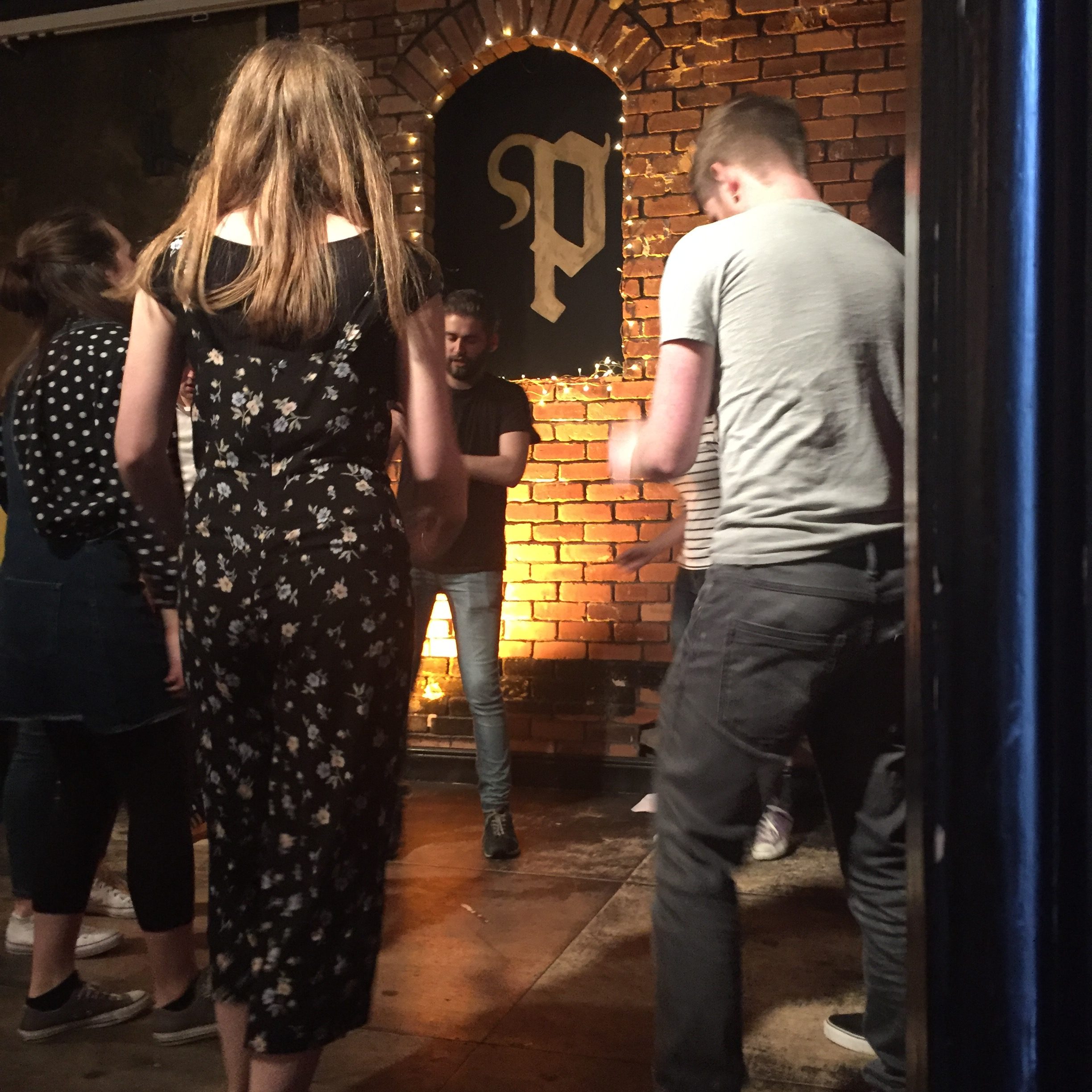
Too often forgotten, but never to be unappreciated in their abilities and dedication are the stage managers. Dunyasha Barrow and Amy Arkle-Jones (mentored by, the festival’s Stage Manager, Steffi Pickering) managed two groups each, in which they took a responsibility for; the sourcing of props and costumes, lighting and sound – all that is technical. Rehearsal reports and call sheets. It is all mind- numbing, so here’s an homage to you guys. Also, there’s young artistic lighting designer Alia Stephen who devotedly lighted every single performance with skillful insight. I’ll move on now, because we all know you’re not ones to relish in the spotlight.
Writers – ever enigmatic and elusive – were to emerge on the Friday morning with their plays to offer, each in their own specifically self-deprecating way. From Monday’s workshop with playwright Mathew Bulgo – hospitable in its musing silence and offerings of Haribo Starmix – the young writers began to develop (or birth) their stories. Bulgo, as well as playwrights Gary Owen and Alun Saunders, tutored their writers through the struggles of writers block and finding their own voice. Seamlessly flowing words, the visualisation of text/the creation of something ‘watchable’ – the pinnacle of the craft. They are all very smart, but in addition to that, writers strip themselves to expose a vulnerability, which many artists would never dare to do. But, it’s the sharing – that’s the scary part. But, the love they receive from those they share their pieces with – that’s what they chase. From the corner that I peered from, from the bar stool that I perched on, in every initial reading there was a warmth and a collective of smiles as the gravity of what was happening, and what these pieces symbolised, was digested.
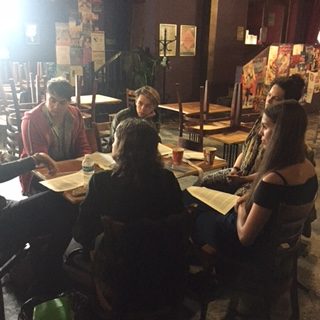
Warlines – Holly Fry
Holly, in response to meeting a sincere and personable tramp in London, took to chronicle the strands of such an unfortunate life. A truthfully cutting Welsh voice. In its simplicity and cheery pessimism, a silenced story and people rise. Insightful and intelligent.
Angus – Bruno Chavez
Daring, unconventional and shameless.
Schizophrenia – a mystery to many in its misrepresentation, and ‘taboo’ nature – is tormenting in its clarity, in this striking piece. Demanding in investment, a menagerie of individual response, as well as embodiment and exploration surfaces, for an audience, as well as performers. In their addressing, the audience are torn from their self-contained bubble, and seized.
Service Please – Melanie Stevens
Melanie Stevens sings the anthem of a people – a people who work in customer service. With a singeing relatability and humour, Melanie encompassed the audience with ease. Within a simple reminder that waitresses are people what surfaces is a profoundly honest, and suppressed outrage.
Always Tuesday – Emily Garside
A real world full of real people. Sometimes it’s hard to imagine.
Emily Garside offers a special relationship – with dark intricacies – and it’s fascinating. Do we just comply with society’s rules of relationships/connecting? And, how meaningful can these ‘approved’ relationships be?
Through art and cake we are happy – discussion or involvement in a form of creation, beauty and self-indulgence. (Garside’s piece, intended or not, truly embodies the Young Artists Festival itself.) Of course, vomit too – as a subject – can fasten a connection with human kind. But, through a fear of rejection, or being denied, we discuss soaps instead of mental illness.
‘I’ve tried mindfulness, but I prefer vodka’
Bloody Paperwork – Lawrence Quilty
Is there truly a humanity behind politics? Politicians. What are they pushed to? Trained to be? I ask because I have no idea. Like, how I assume, many of us feel about politics.
Something highlighted in a rehearsal of the piece was the character’s movement. Confined by so many bodies Aiden Glass (MP) can only infiltrate or resign – a life in parliament. But, these people have families. Those families are hounded as the tabloid media stir and agitate within the pot-holes of fear within a nation. Corruption has seeped so deep it has stained even the bed-rock of our democratic nation.
Quilty skilfully probes into the intrigue of a plagued and destructive system.
Who Was Howell Davies? – Dai Hill
Death is awkward. Where is the line when discussing the dead? Perceptive in the exploration of a relationship between father and children, and with a compassion documents the life of a man plagued by his hindrances. A blinding ignorance and naivety in Hill’s characters sources a golden Welsh humour. But, with it comes the undertones of a despondent, misogynist Welsh working class.
Beautiful – Susan Monkton
A conflict of interest. Rape. Who is to blame?
An issue as relevant today as it was for previous generations. A simple misunderstanding, illustrated through destructive, self-assured monologues. Monkton’s twining of dialogue highlights a desired gender equality disregarded by the sports industry. Class, sexism, mental illness all suppressing; whether they silence or provoke is profoundly individual. The actors sat, inactive. In its rehearsed reading Emily Stroud brought a required simplicity to the staging; it is how it is deciphered – true and false.
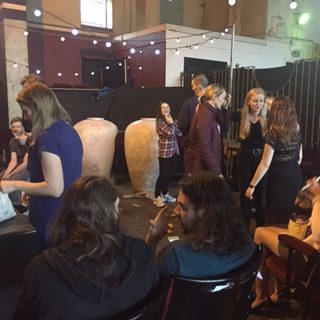
Lastly, I would just like to thank all the wonderful artists who welcomed me to create with them, and shared their work with me. I don’t doubt that I will see you and your work sometime in the near future, hopefully in The Other Room.
Get The Chance has a firm but friendly comments policy.
